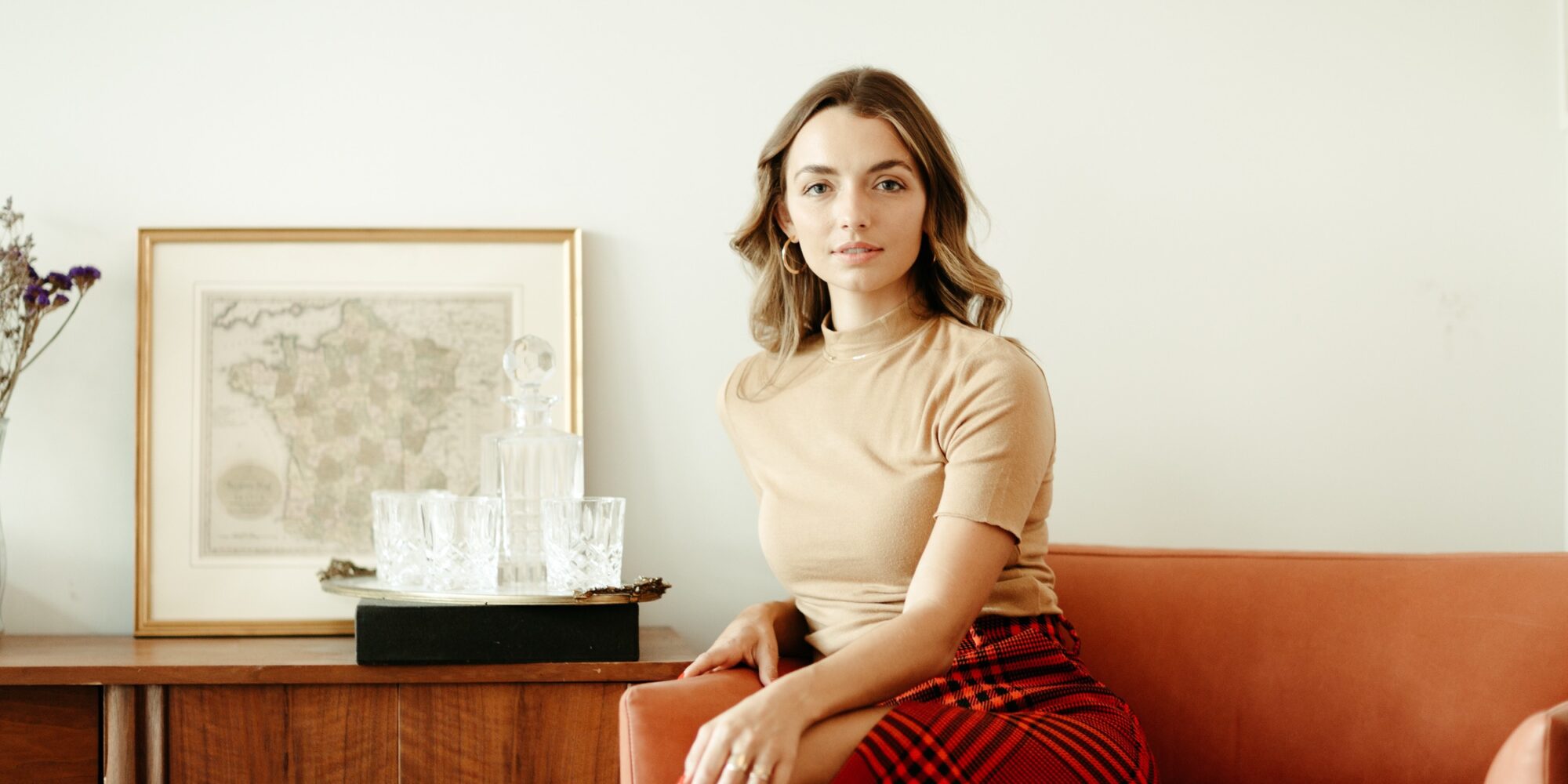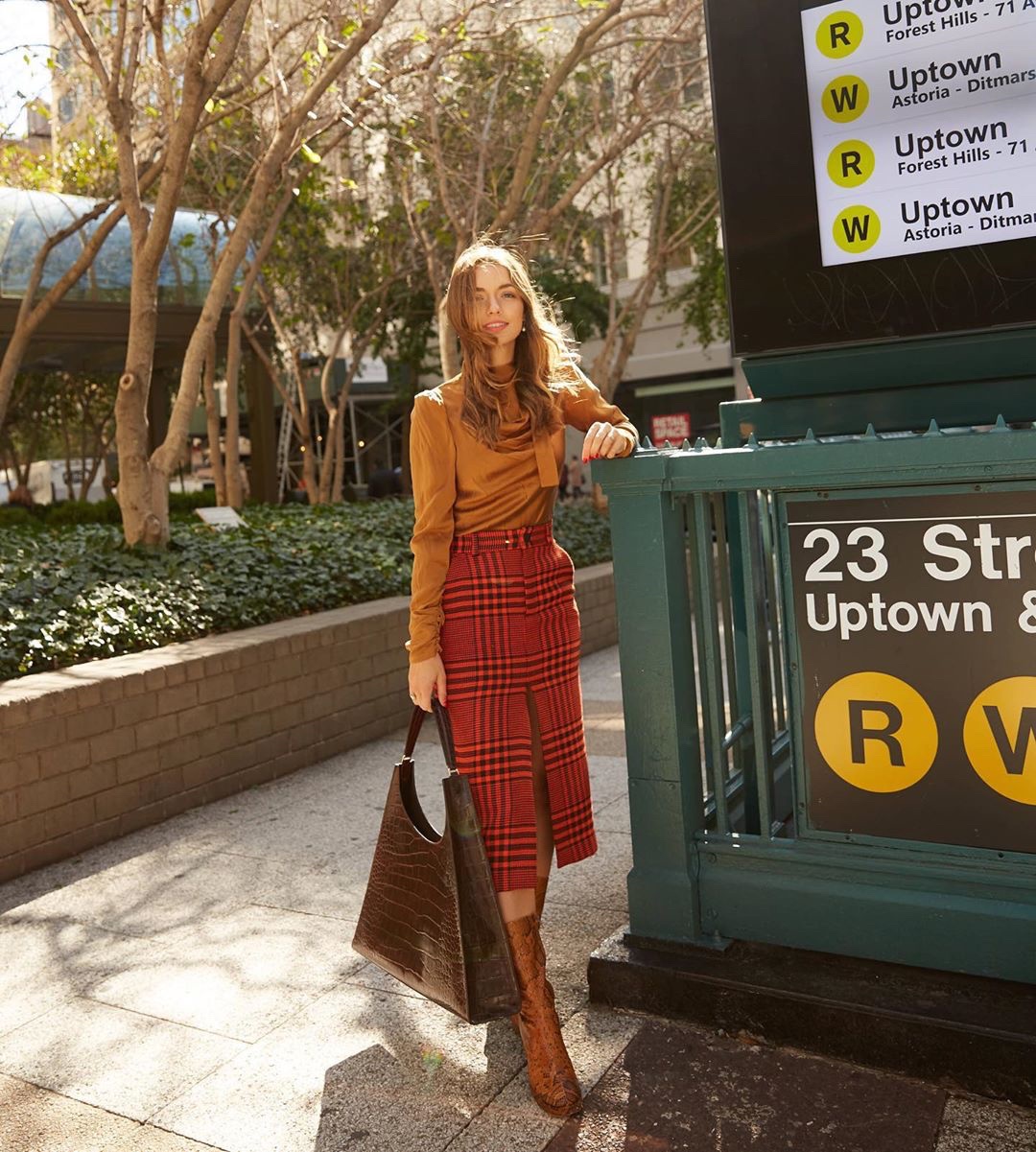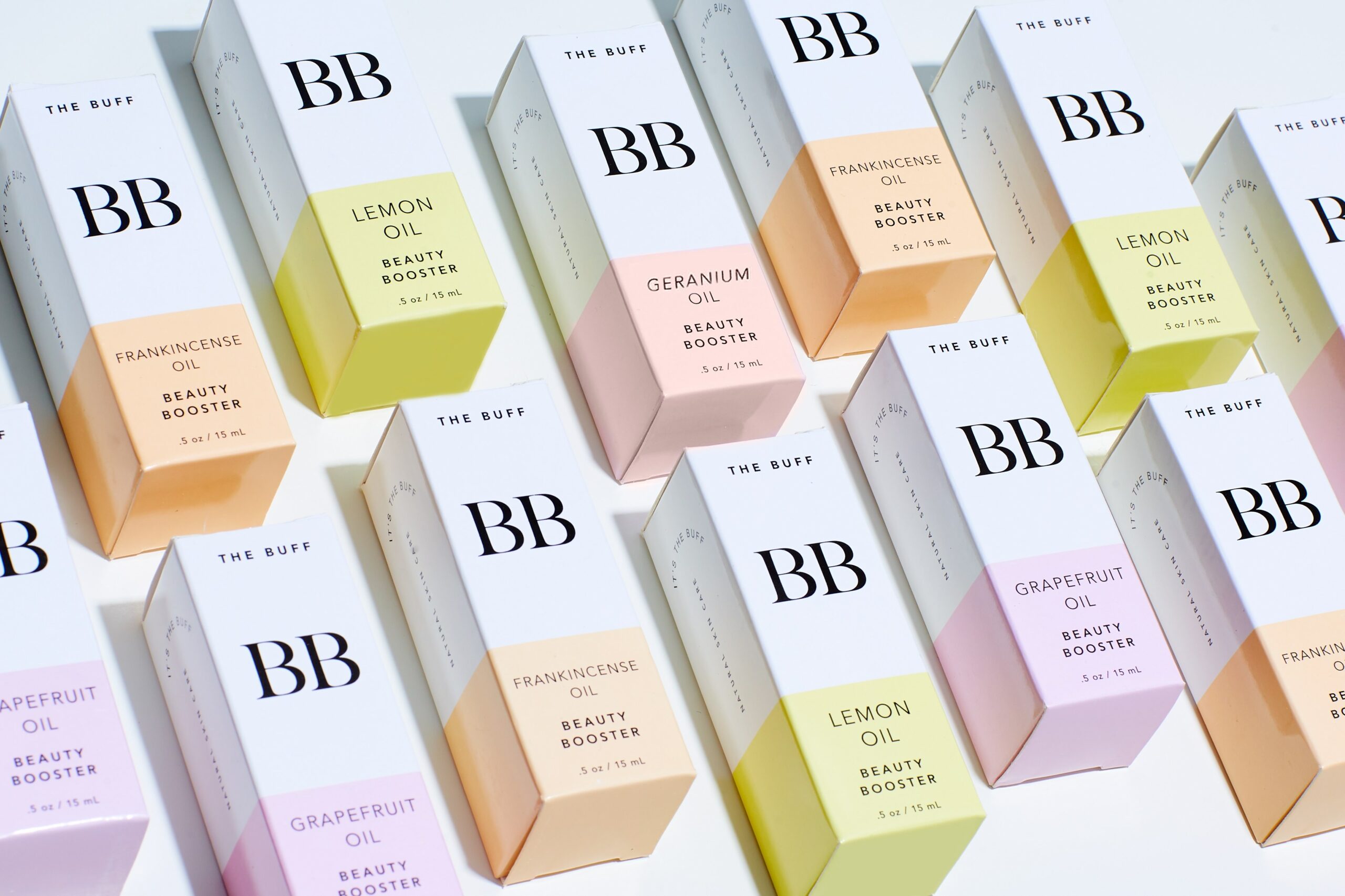
Meet The Skincare Entrepreneur And Former Editor Trying To Make Success For Woman-Founded Brands Far More Common
In an Instagram post from content and event platform Female Founder World, Cinch Skin founder Renee Moore shared what brands should include in retail pitches. During a podcast episode, Blueland CEO and co-founder Sarah Paiji Yoo dished on how she drums up demand for products. At an event, Deco Miami founder Julianna Dahbura discussed the strategies behind fruitful collaborations. The entrepreneurs are spilling business secrets to Jasmine Garnsworthy, founder of Female Founder World and skincare brand The Buff, not for personal gain, but as part of an effort to make successful woman-founded businesses a common rather than rare phenomenon.
“I am a woman building a consumer brand and just naturally the folks that I was speaking with were also women building consumer brands, and I found that really powerful and helpful,” says Garnsworthy. “And I wanted to amplify their knowledge and community.” She points out that less than 2% of female-founded companies hit $1 million in revenues—and she’s adamant the world would be better if it was more female-led and that percentage increased. In a recent interview, Beauty Independent chatted with Garnsworthy about how Female Founder World started and its mission, her experience launching a skincare business, celebrity beauty brands, girlboss takedowns and the importance of events today.
How did you get into what you’re doing now?
My background is in media. I worked as an editor and writer for most of my career. I was the fashion editor at PopSugar in Australia, and then I came to New York with StyleCaster eight years ago. I freelanced for a number of years as well. I launched a small beauty business called The Buff in 2017 based on Australian jojoba oil.
I was running it, doing freelance writing and some brand consulting, and 2020 happened and things got hairy and difficult with the business. I reached out to founders I had connected with while I was an editor and asked them, “How you are handling the supply chain issues?” I was leaning into my network so much and struggling to find information through podcasts and Googling resources. It really drove home to me how important a founder network is when you are building a business.
I started taking Zoom calls I was having into the public realm. Because of my background, it felt like a natural extension. In late 2020/early 2021, we started hosting the founder-led Zoom calls. We had Ali Kriegsman from Bulletin in one on networking and partnerships. We had a venture capitalist lead a workshop on building a pitch deck.
It started informally whenever I would find someone interesting, but then it got pretty popular and began filling up really quickly. The next logical thing was doing a podcast. We launched it about eight months ago and built that into a newsletter series and started dong physical events as well. We had an event with Shopify in April and are doing another one in August in LA. That’s become a huge focus for me now and has taken over the beauty business in terms of my day-to-day focus.
What’s wrong with the current state of beauty journalism?
In consumer-facing beauty journalism, there’s a huge focus on what’s new. It’s about trying to find something exciting to share with people in digital where it’s so fast-paced, and I think there’s a real push toward having new products all the time and this culture of overconsumption.
That’s impacting brands and making them feel they need to release things really often, and I don’t think it’s necessarily healthy from a brand point of view to be releasing products so quickly when maybe a considered and thoughtful approach would be better. They constantly feel they need to be relevant and urgent to fit the news cycle. It’s not necessarily any one institution’s fault, but it’s a problem that’s not good for the brands and not right for the planet.
Looking back, is there anything you would’ve done differently at the early stage of your brand?
Early on, you are figuring out things on the fly. I wasn’t rooting the product development in customer data. It was more intuitive. Now, it’s much more rooted in the feedback we are getting from folks. Do they like it or not? Those insights go into what to develop next. The vetting before you go into product development is important.
When you’re really new, you are so constrained by budget and MOQs for who you work with. As you get bigger, you have exposure to more established and I guess high-quality partners. I think I would have invested more in the early days in a larger run of products because I would have worked with a more knowledgeable partner. I feel like you need that expertise when you don’t have it yourself.

How much did you invest to develop The Buff?
I didn’t spend a lot of money. I used a Squarespace website, and I worked with a designer from StyleCaster. I speak with founders of other brands who launch with $10,000 or $30,000—and some that are venture-backed that are way, way bigger. I don’t think there’s a specific number, but, if you want to go into retailers, $20,000 is doable with one SKU. More money makes things easier, but I don’t think it translates to product quality, and you can find great designers who are willing to work within that kind of budget.
What were your ambitions for your brand?
Going into it, I didn’t have any expectations. I was very much just excited that people liked it and that was enough. I felt like everyone has dreams of being stocked in Sephora or something like that, which we are not. In 2017, it was peak Glossier time. People were seeing DTC brands skyrocket, and that was an inspiration behind starting the business and understanding what was possible in beauty.
Do you think you could’ve started your brand today?
The thing that got us a lot of buzz at the time is a quiz, which wasn’t very common. We were doing a little bit of customization in terms of the packaging and using the quiz as a diagnostic tool. That got us a lot of press attention, and people were really excited to try it. That’s table stakes now. There’s a Shopify app where you can just build a quiz for $10 a month or something like that, whereas we had to hire a developer to build it. For that reason, it wouldn’t be enough to stand out.
I definitely think that it easier than ever to launch a beauty business right now, but it’s harder to stay relevant. The barriers to entry are so low, you can release a product pretty easily now, and you can get some traction on TikTok, but it’s actually about sustaining that brand and remaining relevant while thousands of other brands are popping up around you. So, I don’t know if we would have cut through launching with the same tactics we did. It would need to be a fresh angle and really geared to TikTok.
What’s your take on the girlboss takedown?
I’ve talked about this on my podcast to founders a lot because it’s complicated and nuanced. I’m really grateful for a lot of those founders. Yes, it may not have been a particularly inclusive approach to feminism and entrepreneurship, but they definitely opened a lot of doors and inspired me.
In the same way we look back at “Sex and the City” and see how it was new and revolutionary at the time, I think that, in historical context, if you are looking at female founders that came up through that DTC era and embodied the girlboss vibe, there was a time and place for them and their role.
But I think it’s unfair for people to be roped into that and for female founders to be described in this language of the girlboss. In not just the media, but definitely in the media, we love to build up women as role models and then we love to bring them down. That’s no different from celebrities, and we are seeing that happen now for female founders and entrepreneurs.
What do you think of celebrity beauty brands?
Look, I definitely can understand why celebrities want to create beauty brands. It’s a natural extension for so many of them, but I do think that maybe there’s enough, and they should be coming to it with a little more intentionality and innovation, and that’s reflected in the way that audiences are responding to them as well. I don’t think they are performing as well as you would expect.
What’s your day-to-day process like?
We are releasing three episodes of the podcast a week at the moment. I have a remote editor and a remote virtual assistant. The assistant supports with scheduling. We automate with the platforms Calendly and Zapier. With Zapier, you can connect your Google Sheets with your emails. I highly recommend it.
We leverage automation as much as we can in the outreach and onboarding process. When somebody sets up a time, there’s a drip with emails that come through about how to prepare, what to expect and confirmations. I usually prepare the day of the interview. I listen to other podcasts they’ve done and read up on them.
Once someone is on the calendar, I follow them on social media and get a good idea about what they are about and what their team looks like. We talk on the phone, and I use a platform called Squadcast to record the podcasts. Then, they go off to the editor, and he edits and I give reviews. They’re published two weeks later.
What are things founders have said that have stuck with you?
So much! Cyndi Ramirez gave a really great piece advice that I’ve done throughout my career: When you go to panel events and you are watching entrepreneurs or experts speak, don’t just focus all your attention on the panel. Really look at who is around you and build your network. Peer mentorship and networking is really powerful.
Charlotte [Pienaar] from Everyday Humans is one of the most data- and process-oriented founders I’ve ever spoken to. Her approach to systemizing her business is really interesting. I would love to host a workshop with her about her approach and systems because she’s such a brain.
I’ve also had conversations with founders about interesting sustainability trends, and one of them was around upcycled ingredients in skincare. That is the next frontier in sustainability. And I’ve had conversations about the role of TikTok and the expectations put on particularly female founders to be fronting their brands on TikTok and what being the face of a brand means for scaling a business.
What are some of your favorite beauty products outside of your brand?
The Mara Cleansing Oil Is really good. It’s lightweight, and it doesn’t leave a greasy residue on your face. It’s a product that I’m using really regularly. I also love Everyday Humans Oh My Bod daily body sunscreen. I love the Chillhouse Chill Tips. Supergoop Glowscreen is another good SPF, and I’m also really into nail sticker decals from the brand Deco Miami. When I don’t have on Tips or I don’t have a manicure, I enjoy popping those on because they’re really cute.
What’s your business model at Female Founder World?
Right now, we are an advertising model. We work with tech platforms, and they are our biggest sponsors. We haven’t introduced any kind of subscription into our community yet, but I’m exploring that. I think there are a lot of independent smaller communities and businesses in this space that are selling educational content, selling community. There’s a lot to explore, but I’m not sure what that looks like for us. The event we did was very successful, so events and trade shows are something we are interested in exploring more.

Can brands get involved?
We do packages for the podcast, newsletter and social, and they can sponsor our workshops. They can individually sponsor something or they can purchase a package over a period of time that gives them ownership over all of those pieces of content. The pricing varies on what the timeframe and the product are. For example, the newsletter would be the least expensive thing to advertise in, and the most expensive would be the in-person events.
Have events changed much due to the pandemic?
My experience hosting in-person events in New York is people are actually starved for them. People want to be out of the house and making in-person connections. I think there’s a level of expectation that you will have a hybrid model, which is hard to do, especially if you are trying to do a livestream as well as have an in-person panel. Aside from that, the demand for events is higher than ever.
What are goals you have for Female Founder World?
A short-term goal is to build out our community hub. We are pretty fragmented across the podcast and newsletter. I want to bring everything under one home so people can find each other and the resources we create. Another goal is to nail down our physical event strategy. I don’t know if that’s the best business model, but it’s something I’ve personally loved doing, and I think in-person connection can’t be beat. I’m interested in how you scale a business that’s heavily rooted in in-person events. It’s about figuring that out.
What are goals for your skincare brand?
I don’t know to be honest. We are a small e-commerce business. Right now, I’m going through a relaunch of the site. We have a heavy focus on customization and monogramming, which aren’t as exciting and relevant as they once were, so we are definitely thinking about what it looks like to have a beauty business that stands out in 2022, 2023 and beyond. That does look different than what we did in 2017. We will be rooted in the same product philosophy, but the brand needs to grow up and evolve.
What’s the bigger, overarching goal for what you’re doing?
I think, if more women have more money, only good things happen, and one of the ways to make that happen is for more women to build businesses that are financially successful. That’s what we are trying to help by making introductions, creating content and generally bringing people together to get the resources they need.





Leave a Reply
You must be logged in to post a comment.